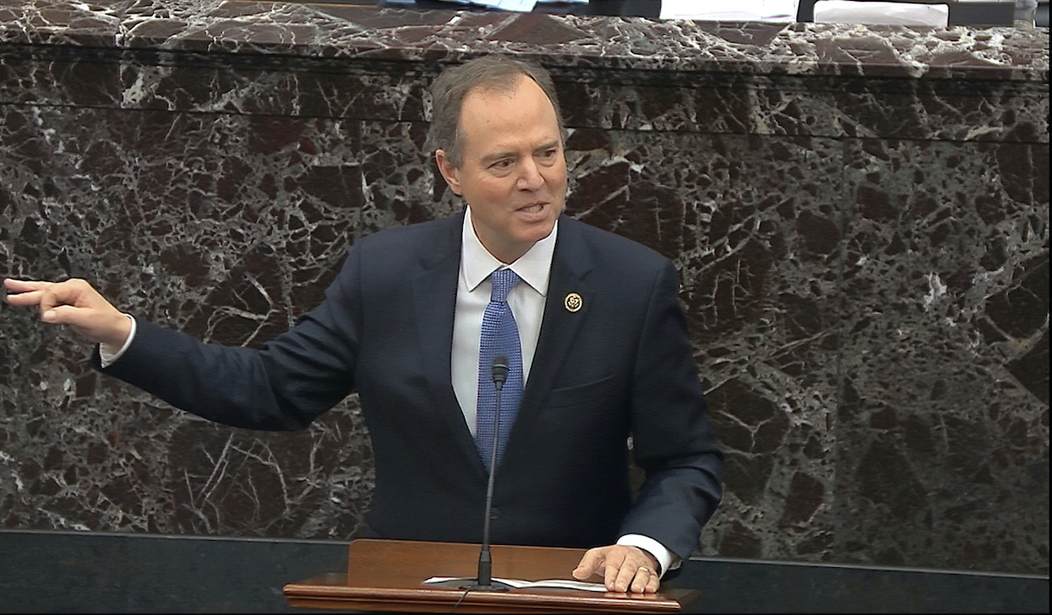Just before 45 Republican senators voted against considering Donald Trump's impeachment on the grounds that the Constitution does not allow the Senate to try a former president, Majority Leader Chuck Schumer dismissed their argument as transparently bogus. "The language is crystal clear, with no ambiguity," the New York Democrat insisted.
If that were true, legal scholars would not still be debating this issue 233 years after the Constitution was ratified. As the Senate prepares to try Trump on the charge that he incited the Jan. 6 Capitol riot with false claims of a stolen election, one thing is "crystal clear": There are plausible arguments on both sides of the debate about whether that proceeding is constitutional.
The clearest historical precedent for Trump's trial is the case of William Belknap, who resigned as secretary of war in 1876 just before he was impeached by the House on corruption charges. While most senators thought Belknap's resignation did not put a stop to the case against him, the minority who disagreed was large enough to ensure his acquittal -- the same outcome we are likely to see in Trump's case.
The basic reason for this disagreement is that the Constitution, contrary to what Schumer seems to think, neither explicitly allows nor explicitly prohibits the impeachment of former officials. The question, therefore, hinges on the history and purposes of the impeachment power, which are open to interpretation.
Michigan State law professor Brian Kalt, who published a comprehensive 2001 survey of the subject in the Texas Review of Law and Politics, argues that the weight of the evidence favors the constitutionality of "late impeachment." But he calls it "a close and unsettled question."
Recommended
George Washington University law professor Jonathan Turley is skeptical of the case for late impeachment, which he says does not easily fit the constitutional text. But like Kalt, he describes the issue as "a close question upon which people of good faith can disagree."
Preconstitutional practice in England and America included the impeachment of former officials. Ten of the 12 state constitutions that were written before the U.S. Constitution was drafted addressed impeachment. In those state constitutions, Kalt notes, "late impeachment was either required, permitted, or not discussed, but was nowhere explicitly forbidden."
Did the framers mean to break from historical practice by limiting impeachment to current officials? If so, they never clearly expressed that intent.
The Constitution says "the President, Vice President and all civil Officers of the United States, shall be removed from Office on Impeachment for, and Conviction of, Treason, Bribery, or other high Crimes and Misdemeanors." It gives the House the "sole Power of Impeachment" and the Senate "the sole Power to try all Impeachments," while limiting the penalties to removal from office and disqualification from future federal office.
This "poor drafting," as Kalt describes it, leaves unresolved the question of whether the optional penalty of disqualification is enough to justify a Senate trial when the mandatory penalty of removal from office is no longer possible. As Turley sees it, "a private citizen is being called to the Senate to be tried for removal from an office that he does not hold."
Kalt and many other scholars argue that the aims of accountability and deterrence would be frustrated if a president could avoid impeachment or trial by committing "high crimes and misdemeanors" toward the end of his term (as Trump is accused of doing) or by resigning (as Belknap and Richard Nixon did) after his misconduct comes to light. They also argue that disqualification is an important remedy when a president guilty of serious misconduct might plausibly make a comeback.
The "good faith" to which Turley aspires is hard to perceive in the arguments offered by most of Trump's critics and defenders. As Stanford law professor Michael McConnell (who thinks Trump's trial is constitutional) notes, "much of the discussion... consists of motivated reasoning on both sides that no doubt would be the opposite if partisan roles were reversed."

























Join the conversation as a VIP Member